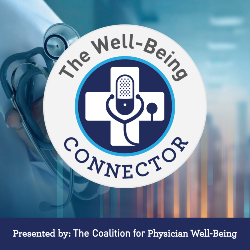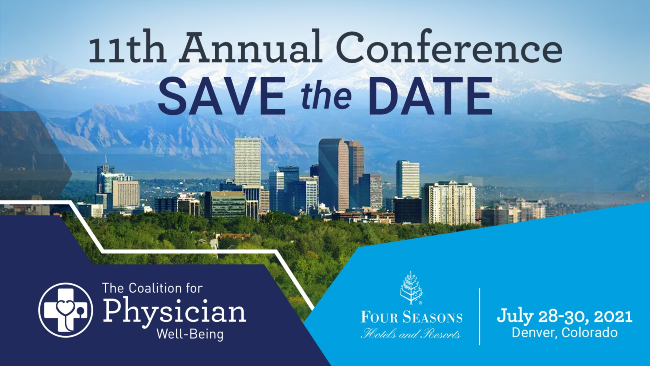|
In This Issue...
- October 16th Webinar - The Shame Conversation: Authentically Engaging with the Risk of Shame in Medicine
- NEW Coalition Podcast
- Featured New Member
- Addressing Postpandemic Clinician Mental Health: A Narrative Review and Conceptual Framework
- The Role of Leaders in Promoting Physician Wellness
- Evaluating the Association of Multiple Burnout Definitions and Thresholds With Prevalence and Outcomes
- Next Year’s Annual Meeting
October 16th Webinar - The Shame Conversation: Authentically Engaging with the Risk of Shame in Medicine

Presenter: William Bynum, MD
Dr. Will Bynum is an Associate Professor of Family Medicine and the Family Medicine Residency Program Director at Duke University. In this webinar, Dr. Bynum, a clinician educator and shame researcher, will utilize personal narrative, theory, and empiric research to explore shame in medical education and outline why a shame conversation is needed in medicine and how to initiate it.
Register to attend: October 16th Coalition Webinar
NEW Coalition Podcast

The Coalition for Physician Well-being is thrilled to launch its new podcast “The Well-Being Connector” hosted by Michael E. Brown, MD. Twice a month, the Coalition will release a new ½ hour episode in which experts in the field are interviewed. Through our guests, you will hear their stories, learn ideas for making healthcare a better place to work and serve. To begin the podcast, we have released three episodes simultaneously. You can listen to the podcast here or through Apple, Google, Spotify and many other podcast apps.
Featured New Member

Lindsay T. Fazio, PhD
Lindsay T. Fazio, PhD is a clinical psychologist and the Director of Physician Wellbeing System in the Department of Family Medicine at North Shore University Health System. She also serves as the Director of Behavioral Science in the department’s residency program. In her leadership role addressing physicians’ wellbeing, she monitors wellness, develops curriculum to advance physician leaders knowledge of wellbeing, and creates initiatives to improve the lives of providers.
She first became interested in physician wellbeing during graduate school when a struggling resident came to her in tears following a difficult patient encounter. Also, her preceptor was passionate about resident wellbeing and inspired her to pursue a career advocating for physicians while creating systems that allow providers to thrive and find joy in their work. By joining the Coalition, she hopes to form collaborative relationships with others and share ideas. She is excited to meet as many members of the Coalition as she can!
Addressing Postpandemic Clinician Mental Health: A Narrative Review and Conceptual Framework
The authors of this article reviewed the literature on post-pandemic clinician mental health and wellness needs in response to both COVID-19 and previous pandemics. They then conceptualized their findings into recommendations for individuals, organizations, and society. Seven suggested interventions emerged from this work:
- The need for resilience and stress reduction training;
- Providing for clinicians' basic needs (food, drink, adequate rest, quarantine-appropriate housing, transportation, child care, PPE);
- The importance of specialized training for pandemic-induced changes in job roles;
- Recognition and clear communication from leadership;
- Acknowledgment of and strategies for addressing moral injury;
- The need for peer and social support interventions and;
- Normalization and provision of mental health support programs.
Read more...
The Role of Leaders in Promoting Physician Wellness
The two below articles have different styles, but they both make the case that especially in this time of the pandemic, leaders have a critical role in promoting physician wellness. Both articles then make suggestions for what they believe should be done.
Evaluating the Association of Multiple Burnout Definitions and Thresholds With Prevalence and Outcomes
Estimates for prevalence of physician burnout can vary drastically depending on how burnout is assessed. In a national study of 6956 general surgery residents, burnout prevalence estimates varied from 3.2% to 91.4%, depending on the burnout definition selected. However, frequent burnout symptoms were strongly associated with both thoughts of attrition and suicide, regardless of the threshold selected. Future research on burnout should explicitly include a clear description and rationale for the burnout definition used. Read more...
Next Year’s Annual Meeting

Message from the Editor
Do you have information that you would like to publish in our newsletter? If so send me (Michael Brown [email protected]) what you wish for us to include. Here are some potential ideas you might wish to submit:
1. Events related to the mission that you are running or attending
2. Recently published research that you found interesting
3. Relevant job postings
4. Member job changes or advancements
5. Relevant efforts for which you are looking for collaborators
6. Anything else you believe might be of interest to coalition members
Michael E. Brown MD, MS, MHCM, CHCIO
[email protected]
www.linkedin.com/in/michaelbrownmd/
Newsletter Editor
|